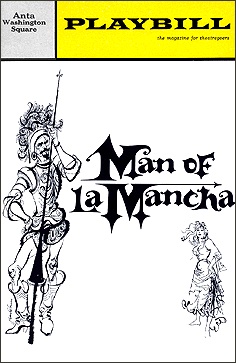
Man of La Mancha is a 1965 musical with a book by Dale Wasserman, music by Mitch Leigh, and lyrics by Joe Darion. It is adapted from Wasserman's non-musical 1959 teleplay I, Don Quixote, which was in turn inspired by Miguel de Cervantes and his 17th-century novel Don Quixote. It tells the story of the "mad" knight Don Quixote as a play within a play, performed by Cervantes and his fellow prisoners as he awaits a hearing with the Spanish Inquisition. The work is not and does not pretend to be a faithful rendition of either Cervantes' life or Don Quixote. Wasserman complained repeatedly about people taking the work as a musical version of Don Quixote.

Buddy Hackett was an American actor, comedian and singer. His best remembered roles include Marcellus Washburn in The Music Man (1962), Benjy Benjamin in It's a Mad, Mad, Mad, Mad World (1963), Tennessee Steinmetz in The Love Bug (1968), and the voice of Scuttle in The Little Mermaid (1989).
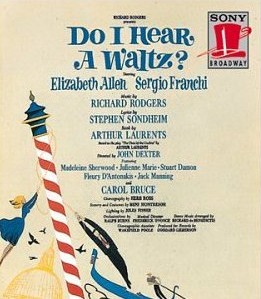
Do I Hear a Waltz? is a musical with a book by Arthur Laurents, music by Richard Rodgers, and lyrics by Stephen Sondheim. It was adapted from Laurents' 1952 play The Time of the Cuckoo, which was the basis for the 1955 film Summertime starring Katharine Hepburn.

Richard Paul Kiley was an American stage, film and television actor and singer. He is best known for his distinguished theatrical career in which he twice won the Tony Award for Best Actor In A Musical. Kiley created the role of Don Quixote in the original 1965 production of the Broadway musical Man of La Mancha and was the first to sing and record "The Impossible Dream", the hit song from the show. In the 1953 hit musical Kismet, he played the Caliph in the original Broadway cast and, as such, was one of the quartet who sang "And This Is My Beloved". Additionally, he won three Emmy Awards and two Golden Globe Awards during his 50-year career and his "sonorous baritone" was also featured in the narration of a number of documentaries and other films. At the time of his death, Kiley was described as "one of theater's most distinguished and versatile actors" and as "an indispensable actor, the kind of performer who could be called on to play kings and commoners and a diversity of characters in between."

The Most Happy Fella is a 1956 musical with a book, music, and lyrics by Frank Loesser. The story, about a romance between an older man and younger woman, is based on the 1924 play They Knew What They Wanted by Sidney Howard. The show is described by some theatre historians and critics as operatic. The original Broadway production ran for 14 months and it has enjoyed several revivals, including one staged by the New York City Opera.

Panama Hattie is a 1940 American musical with music and lyrics by Cole Porter and book by Herbert Fields and B. G. DeSylva. The musical is about a nightclub owner, Hattie Maloney, who lives in the Panama Canal Zone and ends up dealing with both romantic and military intrigue. The title is a play on words, referring to the popular Panama hat.
Jerome Chodorov was an American playwright, librettist, and screenwriter. He co-wrote the book with Joseph A. Fields for the original Broadway musical Wonderful Town starring Rosalind Russell. The musical was based on short stories by Ruth McKenney.

Rosetta LeNoire was an American stage, film, and television actress. She was known to contemporary audiences for her work in television. She had regular roles on such series as Gimme a Break! and Amen, and is likely best-known for her role as Estelle "Mother" Winslow on Family Matters. In 1999, she was awarded the National Medal of Arts.
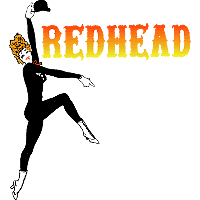
Redhead is a musical with music composed by Albert Hague and lyrics by Dorothy Fields, who with her brother, Herbert, along with Sidney Sheldon and David Shaw wrote the book/libretto. Set in London in the 1880s, around the time of Jack the Ripper, the musical is a murder mystery in the setting of a wax museum.

The Golden Apple is a musical adaptation of parts of the Iliad and Odyssey with music by Jerome Moross and lyrics by John Treville Latouche. The musical premiered Off-Broadway in 1954 and then transferred to Broadway.
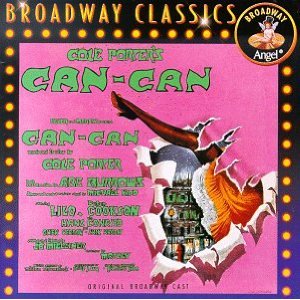
Can-Can is a musical with music and lyrics by Cole Porter, and a book by Abe Burrows. The story concerns the showgirls of the Montmartre dance halls during the 1890s.

Top Banana is a musical with music and lyrics by Johnny Mercer and book by Hy Kraft which premiered on Broadway in 1951. The show was written as a star vehicle for comedian Phil Silvers, who played the host of a television variety show program. Silvers won the Tony Award for Best Performance by a Leading Actor in a Musical in 1952.

Out of This World is a musical with music and lyrics by Cole Porter, and the book by Dwight Taylor and Reginald Lawrence. The show, an adaptation of Plautus's comedy Amphitryon, first opened on Broadway in 1950.

No Strings is a musical drama with book by Samuel A. Taylor and words and music by Richard Rodgers. No Strings is the only Broadway score for which Rodgers wrote both lyrics and music, and the first musical he composed after the death of his long-time collaborator, Oscar Hammerstein II. The musical opened on Broadway in 1962 and ran for 580 performances. It received six Tony Award nominations, winning three, for Best Leading Actress in a Musical, Best Original Score and Best Choreography.
Stanley Freeman was an American composer, pianist, lyricist, musical arranger, conductor, and studio musician.
Alive and Kicking is a musical revue with sketches by Ray Golden, I.A.L. Diamond, Henry Morgan, Jerome Chodorov, Joseph Stein, Will Glickman, John Murray, and Michael Stewart; music by Hal Borne, Irma Jurist, Sammy Fain, Hoagy Carmichael, Harold Rome, Sonny Burke, Leo Schumer, and Ray Golden; and lyrics by Paul Francis Webster, Ray Golden, Harold J. Rome, Leonard Gershe, Sid Kuller, and Michael Stewart.
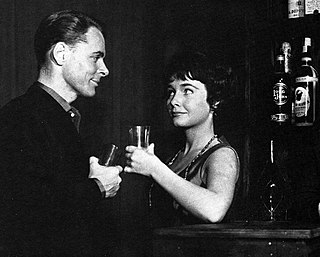
Irma la douce is a 1956 French musical with music by Marguerite Monnot and lyrics and book by Alexandre Breffort. The musical premiered in Paris in 1956, and was subsequently produced in the West End in 1958 and on Broadway, by David Merrick, in 1960. The English lyrics and book (1958) are by Julian More, David Heneker, and Monty Norman.
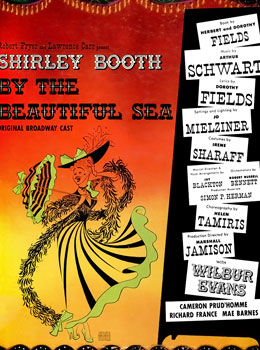
By the Beautiful Sea is a musical with a book by Herbert Fields and Dorothy Fields, lyrics by Dorothy Fields, and music by Arthur Schwartz. Like Schwartz's previous musical, A Tree Grows in Brooklyn, also starring Shirley Booth, the musical is set in Brooklyn just after the start of the 20th century (1907). By the Beautiful Sea played on Broadway in 1954.

Luba Lisa Gootnick was an American actress, singer and television presenter. She received a Tony Award nomination and won a Theatre World Award for her performance in the 1964 musical I Had a Ball.
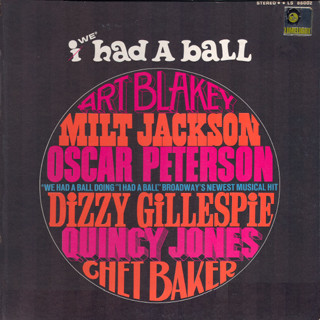
I/We Had a Ball is an album consisting of jazz versions of songs from Jack Lawrence and Stan Freeman's musical I Had a Ball performed by Art Blakey, Milt Jackson, Oscar Peterson, Dizzy Gillespie, Quincy Jones and Chet Baker which was released by Limelight in 1965.

















